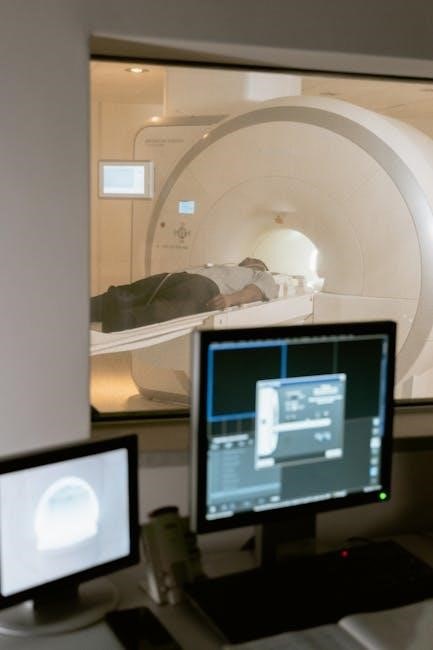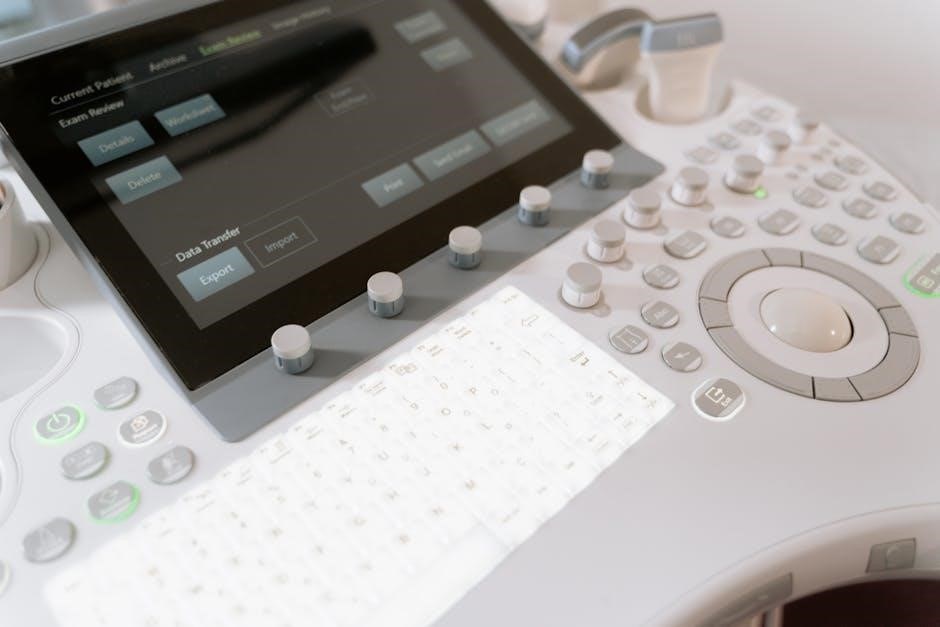Non-verbal reasoning tests assess visual and spatial abilities, often using patterns, shapes, and sequences․ They measure logic without language, ideal for evaluating diverse cognitive skills effectively․
What Are Non-Verbal Reasoning Tests?
Non-verbal reasoning tests evaluate spatial awareness and pattern recognition through visual problems, such as shape sequences and analogies․ They assess cognitive skills independent of language, making them valuable for diverse assessments․ These tests often involve identifying patterns, rotations, and reflections, requiring logical thinking and problem-solving abilities․ They are widely used in educational and professional settings to measure analytical and reasoning capabilities effectively․
The Importance of Non-Verbal Reasoning in Assessments
Non-verbal reasoning tests are crucial for evaluating problem-solving and spatial awareness independently of language skills; They provide an unbiased measure of cognitive abilities, making them fair for diverse candidates․ These tests assess logical thinking and pattern recognition, which are essential for academic and professional success․ By focusing on visual and analytical skills, non-verbal reasoning tests offer unique insights into a person’s ability to solve complex problems and adapt to new challenges effectively․
Structure of a Non-Verbal Reasoning Test
Non-verbal reasoning tests typically include pattern recognition, shape rotations, and sequence completion․ Questions are often multiple-choice, with answers provided for self-assessment and improvement․
Types of Questions: Patterns, Sequences, and Analogies
Non-verbal reasoning tests feature various question types, including pattern recognition, where shapes or colors follow a specific rule․ Sequence questions require identifying the next logical step in a series; Analogies test the ability to find relationships between visual elements․ These question types challenge spatial awareness and logical thinking, ensuring comprehensive assessment of cognitive abilities․ Answers are often provided to aid in understanding and improving problem-solving strategies․
Time Management and Question Formats
Non-verbal reasoning tests often include timed sections to evaluate efficiency under pressure․ Questions are typically multiple-choice, featuring visual stimuli like shapes or patterns․ Proper time allocation is crucial, as each question requires careful analysis․ Practice with timed mock tests helps improve speed and accuracy․ Understanding common question formats, such as sequences and analogies, enables better preparation and effective use of available time to achieve higher scores;
Popular Practice Materials and Resources
Schofield & Sims and CGP offer comprehensive non-verbal reasoning practice papers with answers․ Free PDF downloads are available from websites like sigma-network․ac․uk, providing ideal study materials․
Schofield & Sims Practice Papers
Schofield & Sims provides high-quality non-verbal reasoning practice papers with answers, ideal for 11 Plus preparation․ Their materials include sample questions on sequences, analogies, and shape transformations․ Papers are available in PDF format, offering clear answers and guidance․ Designed for Year 5 students, these resources simulate real exam conditions, helping candidates improve their problem-solving skills․ The detailed answer sheets enable effective self-assessment, making them a valuable tool for mastering non-verbal reasoning tests․
CGP Non-Verbal Reasoning Sample Tests
CGP offers comprehensive non-verbal reasoning sample tests with answers, designed to mirror real exam conditions․ These resources cover patterns, sequences, and analogies, ideal for 11 Plus preparation․ Available in PDF format, they include detailed answer sheets for self-assessment․ The tests are tailored for both GL and CEM formats, ensuring versatility․ CGP’s materials are renowned for their clarity and effectiveness, helping students master non-verbal reasoning skills through practice and detailed feedback․ They are a trusted choice for achieving exam success․
Free PDF Downloads for 11 Plus Preparation
Free PDF downloads for non-verbal reasoning tests are widely available, offering high-quality practice materials․ Websites like Sigma Network and 11 Plus Guide provide mock tests, answer sheets, and sample papers․ These resources are designed for Year 5 students preparing for the 11 Plus exams, covering patterns, sequences, and analogies․ They include timed tests and detailed solutions, helping students enhance their skills and build confidence for exam success․
Preparing for Non-Verbal Reasoning Tests
Regular practice with sample papers and understanding patterns is key․ Utilize resources like Schofield & Sims and CGP for structured preparation․
Effective Study Tips and Strategies
To excel in non-verbal reasoning, focus on identifying patterns and practicing regularly․ Start with simple sequences and gradually move to complex analogies․ Dedicate time daily to solve practice questions․ Use flashcards for quick recall and review answers thoroughly․ Analyze mistakes to improve problem-solving skills․ Incorporate timed drills to enhance speed and accuracy․ Stay calm during tests․ Utilize online resources and PDF guides for structured preparation․ Consistency is key․
Familiarize yourself with key question types: pattern recognition, shape transformations, and analogies․ Practice identifying sequences, rotations, and reflections․ Understand how shapes change in size, color, or orientation․ Learn to spot odd-one-out figures and decode matrices․ Reviewing sample papers helps grasp these formats․ Focus on timing and accuracy․ Regular practice builds confidence and improves performance․ Mastery of these types enhances overall test-taking strategy․ Reviewing answer sheets helps identify strengths and weaknesses․ Analyze incorrect responses to understand common mistakes․ Use feedback to refine strategies and improve future performance effectively․ Reviewing mistakes in non-verbal reasoning tests involves analyzing incorrect answers to identify patterns․ Understand why a specific choice was wrong and focus on the correct reasoning․ Use answer sheets to compare responses and grasp the logic behind each question․ Practice similar problems to reinforce learning and improve problem-solving skills․ Regularly reviewing errors helps develop a deeper understanding of test structures and enhances future performance․ Answer sheets are essential tools for self-assessment in non-verbal reasoning tests․ They provide clear correct answers, allowing candidates to identify mistakes and understand their thought process․ By comparing marked responses, individuals can pinpoint areas needing improvement․ Regular use of answer sheets helps track progress, refine strategies, and build confidence․ This method ensures focused learning and enhanced problem-solving abilities over time․ Advanced techniques involve identifying patterns, rotations, and analogies quickly․ Practicing with materials like CGP and Schofield & Sims PDFs enhances problem-solving speed and accuracy․ The key to mastering non-verbal reasoning is recognizing patterns and relationships between shapes, numbers, and sequences․ Techniques include analyzing shape rotations, identifying symmetries, and understanding sequential progressions․ Practice materials like Schofield & Sims and CGP PDFs provide exercises to refine these skills․ Timed drills and reviewing answer sheets help improve accuracy and speed, enabling candidates to tackle complex questions with confidence․ Non-verbal reasoning tests often involve shape transformations, requiring candidates to identify rotations and reflections․ Practice materials like Schofield & Sims and CGP PDFs provide exercises to improve these skills․ Start by understanding basic transformations, then progress to complex sequences․ Use answer sheets to review mistakes and refine strategies; Timed drills enhance speed and accuracy, helping candidates excel in these visual challenges and build confidence for exam success․ Websites like sigma-network․ac․uk and 11 Plus Guide offer free PDFs of non-verbal reasoning tests with answers, ideal for practice and exam preparation․ Multiple websites provide free non-verbal reasoning PDFs․ Sigma Network offers sample tests and answers, while 11 Plus Guide features practice papers designed for Year 5 students․ These resources include various question types, such as sequences, analogies, and shape rotations, making them ideal for exam preparation․ Downloading these PDFs allows candidates to practice under timed conditions, enhancing their problem-solving skills and exam readiness effectively․ Guides for Year 5 students and beyond provide tailored resources for non-verbal reasoning preparation․ These materials include practice papers, answer sheets, and study tips to enhance problem-solving skills․ Popular publishers like Schofield & Sims and CGP offer comprehensive guides․ They focus on patterns, sequences, and analogies, helping students build confidence and familiarity with test formats․ These guides are essential for improving logical reasoning and achieving success in competitive exams․ Mock tests and timed exams simulate real exam conditions, helping students practice under pressure․ They include timed question sets and answer sheets for self-assessment and improvement․ Mock tests and timed exams replicate the actual exam environment, helping students adapt to time constraints and question formats․ These practice exams include multiple-choice questions, sequences, and pattern-based problems, mirroring real tests․ Answer sheets are provided for self-assessment, allowing students to review mistakes and improve․ Timed conditions ensure students practice managing their time effectively, enhancing their performance under pressure․ These resources are essential for building confidence and familiarity with the exam structure․ Mock tests provide a realistic assessment of a student’s preparedness for non-verbal reasoning exams․ By simulating exam conditions, students can identify strengths and weaknesses․ Answer sheets enable detailed self-assessment, highlighting areas needing improvement․ Timed tests help develop time management skills, ensuring students complete all questions efficiently․ Repeated practice with mock tests allows learners to track progress and refine strategies, building confidence for the actual exam․ These tools are essential for achieving success in non-verbal reasoning assessments․ Non-verbal reasoning tests often feature real-life examples, such as shape rotations or sequence patterns, to assess problem-solving skills․ PDFs with answers provide practical insights and solutions․ Past papers and exams provide authentic examples of non-verbal reasoning questions, such as shape rotations, number patterns, and grid-based problems․ Schofield & Sims and CGP materials offer realistic test scenarios, while free PDF downloads include answer sheets to aid self-assessment․ These examples help candidates understand common question formats, such as completing sequences or identifying analogies, and improve their problem-solving techniques through practical practice․ Successful strategies in non-verbal reasoning tests involve analyzing patterns, practicing regularly, and understanding question types․ Candidates benefit from reviewing answer sheets to identify weaknesses and improve accuracy․ Timed practice with past papers helps simulate exam conditions, enhancing speed and confidence․ Resources like CGP and Schofield & Sims provide structured examples, enabling learners to refine their techniques and master common question formats, such as shape rotations and sequences, effectively․ Mastering non-verbal reasoning requires consistent practice and understanding of patterns․ Utilize resources like CGP and Schofield & Sims for effective preparation and improved test performance․ To excel in non-verbal reasoning tests, focus on identifying patterns, sequences, and analogies․ Practice with resources like CGP and Schofield & Sims․ Time management is crucial, as tests often have strict limits․ Understanding common question types, such as shape rotations and reflections, improves accuracy․ Regular practice with sample papers and mock tests enhances speed and confidence․ Analyzing mistakes helps refine strategies․ Use answer sheets for self-assessment to track progress and identify areas for improvement․ Consistency and dedication are key to achieving success․Understanding Common Question Types

Interpreting Answers and Feedback
How to Review and Learn from Mistakes
Using Answer Sheets for Self-Assessment

Advanced Techniques for Solving Questions
Identifying Patterns and Relationships
Mastering Shape Rotations and Reflections
Accessing Free Resources
Websites Offering Free Non-Verbal Reasoning PDFs
Websites Offering Free Non-Verbal Reasoning PDFs
Guides for Year 5 Students and Beyond

Mock Tests and Timed Exams
Simulating Real Exam Conditions
Evaluating Performance Through Mock Tests

Case Studies and Real-Life Examples
Examples from Past Papers and Exams
Learning from Successful Strategies
Key Takeaways for Success



